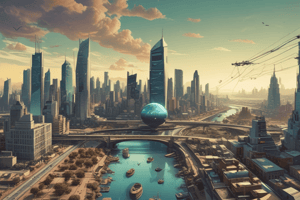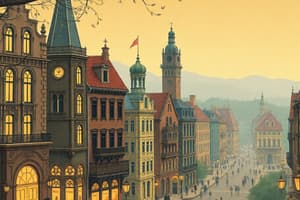Podcast
Questions and Answers
What does urbanization refer to?
What does urbanization refer to?
- The decline of city populations
- The increase in field production
- The movement of people from urban areas to rural areas
- The movement of people from the countryside to towns and cities (correct)
What is demography?
What is demography?
the study of population
What is a tenement?
What is a tenement?
single room apartments often without heating or lighting
What is a political machine?
What is a political machine?
Who are political 'bosses'?
Who are political 'bosses'?
What is immigration?
What is immigration?
What are 'push' and 'pull' factors?
What are 'push' and 'pull' factors?
Who are the 'New Immigrants'?
Who are the 'New Immigrants'?
What are ethnic ghettos?
What are ethnic ghettos?
Who are nativists?
Who are nativists?
What does Americanization involve?
What does Americanization involve?
What is the Chinese Exclusion Act?
What is the Chinese Exclusion Act?
Flashcards are hidden until you start studying
Study Notes
Urbanization
- Urbanization refers to the movement of people from rural areas to urban centers, significantly changing societal structures and lifestyles.
Demography
- Demography is the analytical study of population dynamics, including size, distribution, and trends, influencing various aspects of society.
Tenement
- Tenements are single-room apartments commonly found in urban areas, often lacking basic amenities such as heating and lighting, highlighting poor living conditions for many urban dwellers.
Political Machine
- Political machines represent a corrupt system of political organization that manipulates elections and municipal government operations, often involving bribery and favoritism.
Political "Bosses"
- Political bosses are influential leaders within political machines, wielding significant power over local politics and governance, often prioritizing their interests over public welfare.
Immigration
- Immigration involves individuals relocating permanently to another country, specifically highlighting trends in the movement of people seeking better opportunities, often to the U.S.
"Push" and "Pull" Factors
- Pushed factors originate from the home country, causing people to leave, while pulled factors attract them to a new country, jointly influencing immigration trends to the United States.
"New Immigrants"
- New immigrants primarily arrived from Southern and Eastern Europe during the late 19th and early 20th centuries, frequently identifying as Catholic, Jewish, or Orthodox Christian, contributing to the cultural diversity in the U.S.
Ethnic Ghettos
- Ethnic ghettos are neighborhoods formed by immigrants settling with others from the same nationality, fostering community support amidst cultural adaptation challenges.
Nativists
- Nativists are individuals born in the United States who exhibit hostility towards newly arrived immigrants, often advocating for policies favoring native-born citizens.
Americanization
- Americanization describes the process where immigrants learn to adopt American cultural practices, including language, attire, and social norms, aiming for societal integration.
Chinese Exclusion Act
- The Chinese Exclusion Act, enacted in 1882, was the first federal law to curb immigration to the United States, specifically targeting Chinese laborers, reflecting xenophobic sentiments of the era.
Studying That Suits You
Use AI to generate personalized quizzes and flashcards to suit your learning preferences.




